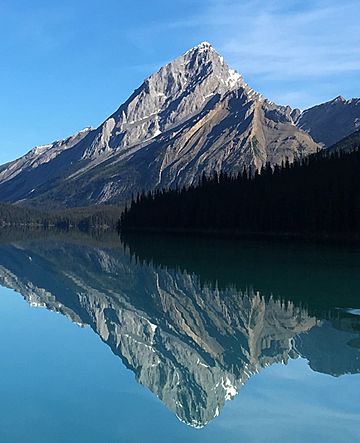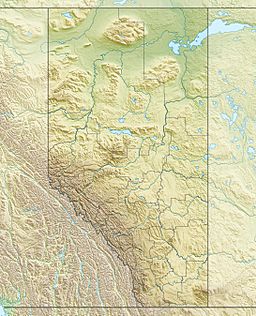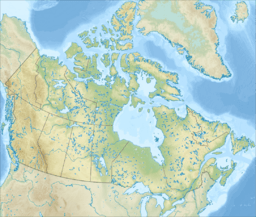Samson Peak facts for kids
Quick facts for kids Samson Peak |
|
|---|---|

Samson Peak reflected in Maligne Lake
|
|
| Highest point | |
| Elevation | 3,081 m (10,108 ft) |
| Prominence | 456 m (1,496 ft) |
| Parent peak | Maligne Mountain (3200 m) |
| Listing | Mountains of Alberta |
| Geography | |
| Location | Alberta, Canada |
| Parent range | Queen Elizabeth Ranges Canadian Rockies |
| Topo map | NTS 83C/12 |
| Geology | |
| Age of rock | Devonian |
| Type of rock | Palliser Limestone |
| Climbing | |
| First ascent | 1928 by W.R. Hainsworth and M.M. Strumia |
Samson Peak is a tall mountain in Canada. It stands about 3,081 meters (10,108 feet) high. You can find it on the eastern side of Maligne Lake in Jasper National Park. This park is part of the amazing Canadian Rockies in Alberta.
The closest taller mountain is Mount Charlton. It is about 7.26 kilometers (4.51 miles) to the east. Samson Peak is also close to Leah Peak, just 1.72 kilometers south. Both peaks are in the Queen Elizabeth Ranges.
Contents
How Samson Peak Got Its Name
Samson Peak was named by a brave explorer named Mary Schäffer. She explored this area in 1908. Mary was trying to find the hidden Maligne Lake.
Mary also named Leah Peak nearby. She named it after Leah Beaver. Leah was the wife of a Stoney First Nation man named Samson Beaver. Samson became friends with Mary. He helped her find the lake.
Samson Beaver's Map
Samson Beaver gave Mary a special hand-drawn map. This map showed her the way to the lake. Samson had visited the lake with his father when he was 14 years old. Sixteen years later, he drew the map from his memory. He met Mary at a cabin in the Saskatchewan Valley.
First Climbers and Official Name
The first people to climb Samson Peak were W.R. Hainsworth and M.M. Strumia. They reached the top in 1928. The mountain's name became official in 1947. This was decided by the Geographical Names Board of Canada.
Weather Around Samson Peak
Samson Peak is in a subarctic climate zone. This means it has very cold, snowy winters. The summers are usually mild. Temperatures can drop below -20 °C ( -4 °F). With wind, it can feel even colder, below -30 °C (-22 °F).
Rain and melting snow from Samson Peak flow into Maligne Lake. From there, the water goes into the Maligne River. The Maligne River then flows into the larger Athabasca River.
 | Delilah Pierce |
 | Gordon Parks |
 | Augusta Savage |
 | Charles Ethan Porter |



